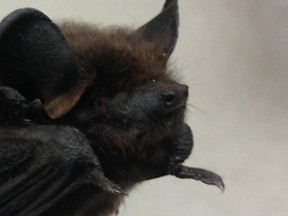Bat in Woodstock tests positive for rabies after five years with no confirmed cases in Oxford

Article content
Stay away from that bat in your barn.
That's the message experts are sharing far and wide after a bat in Woodstock tested positive for rabies last week, marking the first animal case of rabies in the county in over five years.
A local resident was trying to move the bat when they were bitten. That person is currently receiving treatment – a series of five needles, and two types of vaccines, though the injections are no longer given through the stomach.
For Oxford County Public Health, it’s a chance to remind people that bat rabies, and strains in other animals, are a real risk.
“Try to avoid coming in contact with them,” said Elaine Reddick, program supervisor of health protection with Oxford County Public Health. “They do bite, they have very sharp teeth.”
Rabies has been on the rise in the province after a decade-long dry spell. Raccoons and skunks – even a calf – in areas near Oxford have tested positive as recently as this summer. Hamilton and Brant County had 180 confirmed cases of rabies at the end of August.
It’s the raccoon strain of rabies making noise in that region. It first popped up in December last year, causing the Ontario Ministry of Natural Resources and Forestry to jump into action spreading vaccine pods by plane, helicopter, and by hand on land.
“We have these small little packets, they’re about 2 x 1 cm, green in colour…the idea is that you distribute those on the landscape, a fox or skunk or raccoon eats it, vaccine hits the back of the throat and they’re vaccinated against rabies,” said Chris Davies, head of wildlife research and monitoring with the ministry.
They’ve done several rounds of this “baiting” already, extending 50 km out from the outbreak. That boundary covers much of eastern Oxford County, and the additional surveillance zone includes nearly the whole region.
“We started off with a little bit of baiting in December and then winter came and we stopped and then we started again in April,” Davies said.
The ministry is working on a final spread of the vaccine baits this fall to catch all the babies and teenage animals.
“If you get enough of your herd, as they call it, vaccinated, then it stops the spread of disease,” Davies said.
The pods work great for skunks, foxes, and raccoons, but not so well for bats, which eat insects.
“That’s bat strain, so we can’t do anything about that strain. There’s no vaccine for it or anything like that. There’s 20 to 25 cases a year across Ontario,” Davies said.
And because there’s no way to target bat rabies, the case in Woodstock wasn’t completely unexpected, Reddick said.
She sees it as an opportunity to remind urban residents about pet safety.
Cats and dogs have to be vaccinated against rabies by law (even indoor animals) as there’s a higher possibility they may end up meeting rabid wildlife.
Pet owners – and humans without furry friends – need to be cautious.
“Certainly if anybody is ever bit by a bat, a skunk, a raccoon or a fox…they need to seek medical attention right away,” said Reddick.
“Rabies is pretty much fatal in all animals, including humans.”
--- --- ---
STOP THE SPREAD
If you don’t have a veterinarian and your cat or dog isn’t vaccinated against rabies, there are low-cost clinics hosted at a number of local practices on Saturday, Sept. 24.
Times vary, and the cost is $20 cash.
Locations can be found at www.oxfordcounty.ca/health.